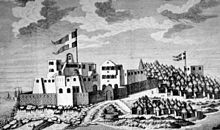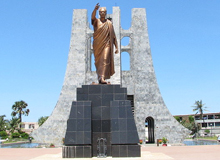 As a child, I often thought of how cool the name of the capital of Ghana, Accra, sounded. My aunt however, told me that it meant ‘beignets‘ in some West African language, and that could not possibly be beautiful. See how funny some words in one’s language could mean something totally different in another. That made me curious to find out about the real meaning of Accra. Well, it is not even in the local language, but rather is a European “deformation”. The main Ga group known as the Tumgwa We led by Ayi Kushie arrived by sea. When the Lartehs of the coast saw them on their canoes at sea, they thought they looked like ants, and thus called them Nkran or ants. Nkran was later deformed by the Danes to Akra, then to present-day Accra. Well, as a fun note, the feeling of an ant walking on one’s skin could make one scream “Aaaaaah Krrrrraaaa”!
As a child, I often thought of how cool the name of the capital of Ghana, Accra, sounded. My aunt however, told me that it meant ‘beignets‘ in some West African language, and that could not possibly be beautiful. See how funny some words in one’s language could mean something totally different in another. That made me curious to find out about the real meaning of Accra. Well, it is not even in the local language, but rather is a European “deformation”. The main Ga group known as the Tumgwa We led by Ayi Kushie arrived by sea. When the Lartehs of the coast saw them on their canoes at sea, they thought they looked like ants, and thus called them Nkran or ants. Nkran was later deformed by the Danes to Akra, then to present-day Accra. Well, as a fun note, the feeling of an ant walking on one’s skin could make one scream “Aaaaaah Krrrrraaaa”!

Jokes aside, originally, Accra was not the most prominent trading center in the country. However, the Dutch built the nearby outposts of Ussher Fort while the British and Swedes built James Fort and Christiansborg castles respectively. By the 17th century, Portugal, France, and Denmark had built forts in the city. As a side, did you know Denmark had been involved in the slave trade? Dutch and Swedes too? The Swedes… in the slave trade along the African coast? For the longest time, I thought the slave trade had only been a Portuguese, British and French affair. So today, the scramble for Africa with the European union, America, China, India, etc… is just a repeat of a 16th – 17th centuries’ history!

Britain gradually acquired the interests of all other countries beginning in 1851, when Denmark sold Christiansborg (which they had acquired from the Swedes) and their other forts to the British. The Netherlands was the last to sell out, in 1871. In 1873, after decades of tension between the British and Ashantis of the peninsula country Ashantiland, the British attacked and virtually destroyed Ashantiland and Ashanti Region capital of Kumasi. The British then captured Accra in 1874, and in 1877, at the end of the second Anglo-Asante War, Accra replaced Cape Coast as the capital of the British Gold Coast. This decision was made because Accra had a drier climate relative to Cape Coast.
As the newly established Gold Coast’s administrative functions were moved to Accra (1877), an influx of British colonial administrators and settlers grew around Christiansborg (modern Osu, Ministries, Ridge, Labone, and Cantonments), and the city expanded to accommodate the new residents. Victoriaborg was formed in the late 19th century as an exclusively European residential neighborhood, located to the east of the city limits of the time. The boundaries of Accra were further stretched in 1908. This expansion entailed the creation of a native-only neighborhood. Adabraka was thus established to the north of the city.

In 1908, the decision was made to build the Accra-Kumasi railway to connect the country’s port with the main cocoa-producing regions. In 1923, the railway was completed, and by 1924, cocoa was Ghana’s largest export.
The modern city of Accra is centered on the original British, Danish, and Dutch forts and their surrounding communities: Jamestown near the British James Fort, Osu near the Danish fort of Christiansborg (now Osu Castle), and Ussherstown near the Dutch Ussher fort.

Tourist attractions include the National Museum of Ghana, the Ghana Academy of Arts and Sciences, the National Archives of Ghana and Ghana’s central library, the National Theatre, the Accra Centre for National Culture, the Jamestown lighthouse, and the Ohene Djan Stadium. The city is also a transportation hub, home to the Kotoka International Airport, and railway links to Tema, Sekondi-Takoradi and Kumasi.
Today, Accra is one of the biggest hubs in West Africa and on the African continent. It is also a place of pilgrimage to many people of African descents trying to retrace their past: African Americans, Afro Brazilians, especially due to the great numbers of slavery forts in the city and country, but also because of the work of W.E.B. Du Bois. Well, if you are ever in Accra, visit, enjoy it, and feel Ghana! The video below will make you want to go there.


Reblogged this on Reggiebankssr's Blog.
LikeLike
Thanks for reblogging!
LikeLike
Pingback: GHANA, My Love! - The Melanated Lifestyle
Accra is one city that I want to visit in Africa. I heard Ghana has one of the biggest African-American expat communities over there. Interestingly enough, I have a character in my book Telestic Estoc named Nsia Accra and I did name her after the city. However, I wasn’t aware of the name origin until now. I guarantee you Nsia has nothing to do with ants though.
LikeLike
Thanks… I will check out
LikeLiked by 1 person
Here’s the link, by the way. https://books.noisetrade.com/cmbbell/telestic-estoc
LikeLike